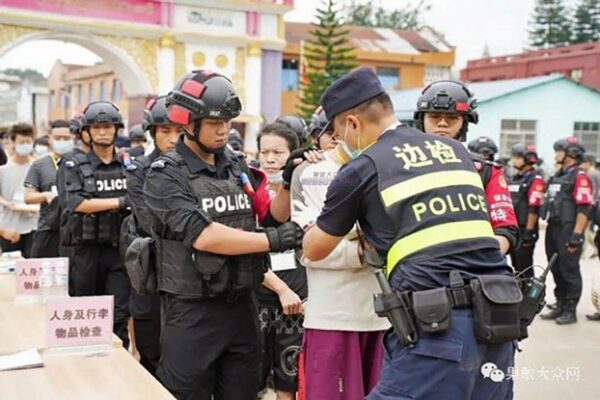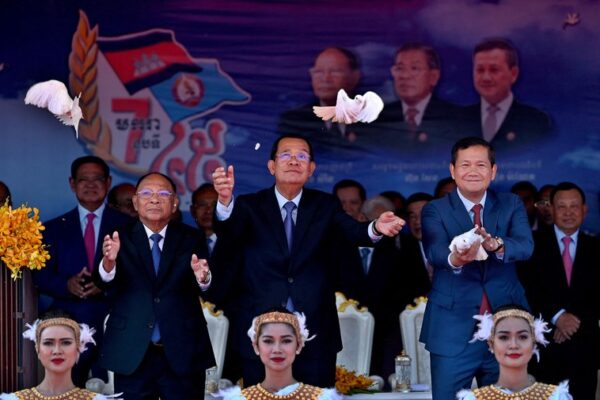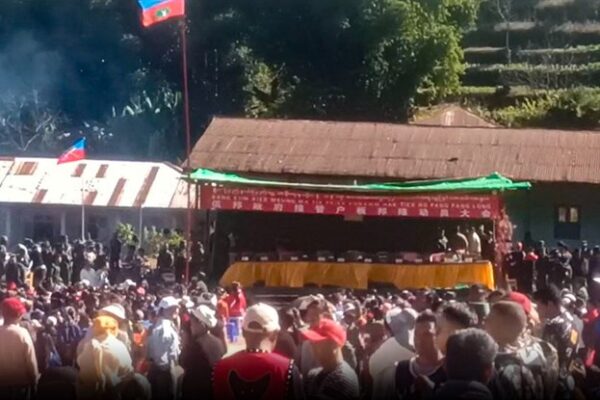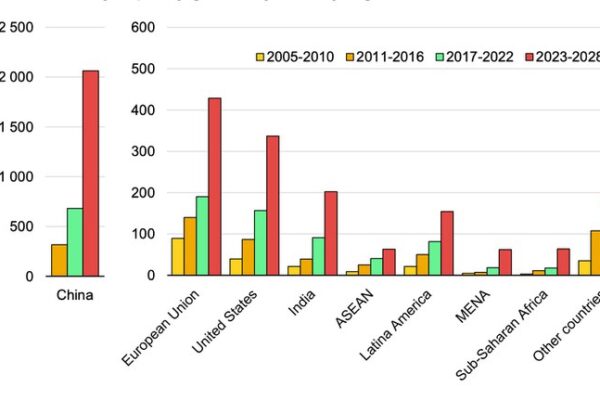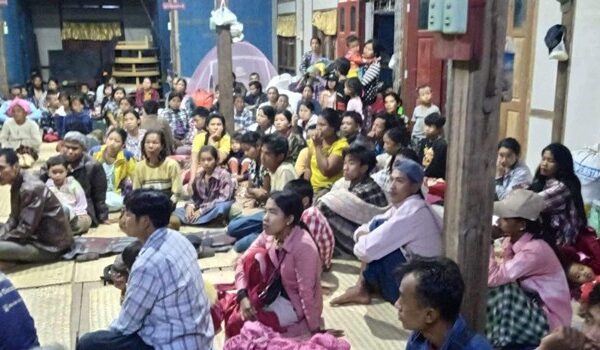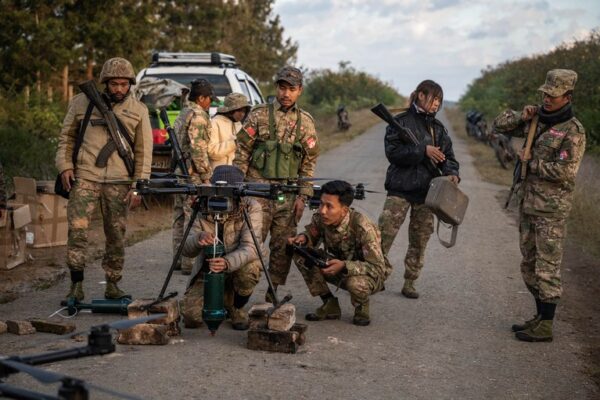
The Myanmar military’s air superiority is slipping away amid sanctions and opposition attacks
One of the most important setbacks for Myanmar’s military since an opposition alliance launched Operation 1027 last October has been the loss of three different aircraft: two jet trainers and an Mi-17 heavy-lift helicopter. An Mi-35 attack helicopter was also lost in 2023. The Myanmar military should have total air superiority. For the first two years of the conflict, the opposition National Unity Government’s (NUG) best air defense was doxing Air Force pilots – publishing their addresses, as part of an assassination campaign. Gradually, the NUG’s People’s Defense Force militias began to erode the junta’s air superiority by effectively deploying armed drones. Significantly, we’re now seeing Ethnic Resistance Organizations (EROs) begin to deploy air defenses, at a time when the junta has become even more dependent on air attacks. That increased tempo of operations requires more maintenance on overworked airframes. Fighters of anti-junta Mandalay People’s Defense Forces prepare a drone with an explosive-drop amid clashes with Myanmar junta forces in northern Shan State, Dec. 11, 2023. These military junta losses matter for three reasons. First, while not small by regional standards, the Myanmar Air Force (MAF) certainly does not have excess capacity. At the top end, it has some 31 SU-29s and four recently delivered SU-30s from Russia. The recently delivered seven JF-17s multi-role fighters, jointly produced by China and Pakistan, are reportedly already grounded due to cracks in their airframes and other maintenance issues. Airworthiness questions On paper, Myanmar has approximately 40 other jet fighters, but these are old, Chinese-produced knock-off Russian jets from the 1990s. They are well beyond their service life. The MAF is thought to have 20 Nanchang Q-5s, the Chinese version of the MiG-19, down from the 36 it imported from 1994-2001. It also has some 21 Chengdu J-7s, a Chinese produced MiG-21. That’s down from some 60 that it had purchased from 1990-1999. It’s unclear how many of these fighters are still airworthy. Myanmar’s military has relied on its 18 Russian-built Yak-130 trainers for much of its combat operations. Since the February 2021 coup, Myanmar has taken delivery of some six Guizhou JL-9 jet trainers, referred to as FTC-2000G, which have a spotty performance and safety record. A fighter of anti-junta Mandalay People’s Defense Forces pilots a drone near the frontline amid clashes with Myanmar junta forces in northern Shan State, Dec.11, 2023. (AFP Photo) The MAF also flies an unknown number of Chinese K-8 trainers that can be used for ground support. Second, we should also assume that given sanctions on the Singapore-based companies that have been the key importers of spare parts, the overall lack of foreign exchange available to the junta, and other supply chain issues, including those caused by Russia’s war in Ukraine, that around 20% of the aircraft are probably not operational. In December 2023, the sanctioned director of Sky Aviator and two others were caught trying to smuggle 508,925 Singapore dollars (US $382,380) in cash out of that city-state. Sky Aviator, which has an office in Singapore, had a large contract to purchase spare parts for the air force. Another sanctioned firm, Sky Royal Hero Company Limited, has the contract for the maintenance and spare parts for servicing the Russian jet fighters. For nearly three years, the MAF has been flying at increased tempos without the scheduled maintenance they require. Airstrikes ramping up The military’s promised counter offensive has not materialized. Over 4,000 troops have surrendered since Operation 1027 began, and well-documented recruitment issues mean the military does not have a sufficient number of troops to launch ground offensives across the multiple battle zones, which has forced them to rely on long range artillery and air strikes. An independent research firm documented 336 airstrikes in December 2023, alone, with nearly half against the Three Brotherhood Alliance, the group of ethnic armies behind Operation 1027.. The loss of one of their 12 already over-taxed heavy lift helicopters is another important setback for the military’s counter-offensive. One of their tactical advantages has been air mobility and resupply, especially given their loss of key roads. Although the Kachin Independence Army (KIA) claims to have shot down the Guizhou JL-9/FTC-2000G on Jan. 17, there is little evidence to support this, Video footage that shows the plane falling from the sky, without smoke or any other sign of hostile fire, indicates likely engine failure. Myanmar Air Force Jet fighters drop bombs during military exercises in Ayeyarwady delta region, Feb. 2, 2018. (Lynn Bo Bo/Pool via AP) That leads to the third implication: The MAF is losing aircraft to hostile fire. While the military claims that it was a technical malfunction that brought down a K-8 trainer, Karenni forces claim to have shot it down. The KIA claims to have shot down an Mi-17 transport helicopter, killing all six crew members on Jan. 3. Both helicopters and the trainers, especially when they are being used for ground attacks, are vulnerable to small arms fire. Eyes on Beijing But these developments also beg the question: What weapons are being used to down the aircraft? The only ethnic armed group that is known to have shoulder-launched surface-to-air missiles (known as MANPADs) is the United Wa State Army (UWSA). Until very recently, the UWSA has sat out the conflict, neither supporting the junta nor joining the NUG. It recently declared its neutrality in the Three Brotherhood Alliance’s Operation 1027, though it did receive two townships from them. A man looks on at homes destroyed after air and artillery strikes in Mung Lai Hkyet displacement camp in northern Kachin state, Oct. 10, 2023. (AP Photo) Though the UWSA has quietly sold weapons to other ethnic armies and the NUG, it has, to date, refrained from selling MANPADs. Has that changed? And if so, why now? It was long believed that they would not sell the weapons for fear of angering China. So did China approve the transfer, or are the groups now willing to incur Beijing’s wrath? The KIA claims that they shot down the Mi-17…

